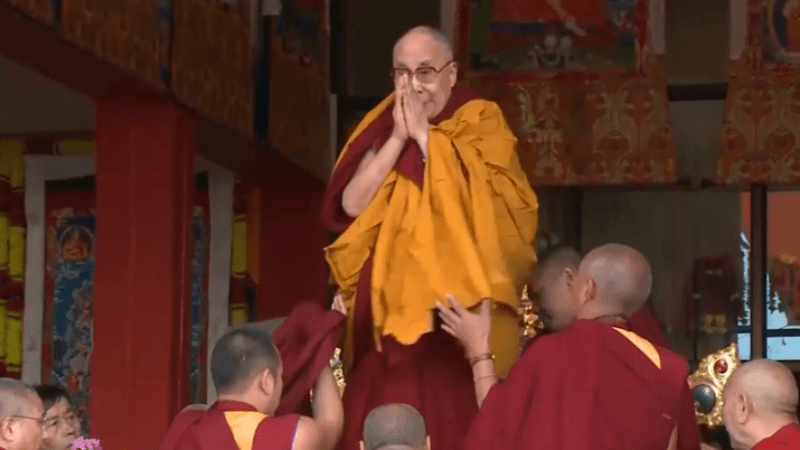
If India believes that it can win peace with China by giving up on Dalai Lama and the Tibetan Buddhists it's a mistake. In history, more conflicts have ended with one side keeling over than when smart diplomacy paid dividends. If the Dalai Lama snub is a message to China that India likes to steer clear of trouble, it's also sign that India has ceded too much ground to the rival and neighbour.
The 14th Dalai Lama has been a lynchpin in the India-China geopolitical dynamic for more than half a century. India has hosted the Tibetan spiritual head and thousands of his followers in the country ever since they fled the home land in 1959 to escape Chinese repression. While India played generous host to the Tibetan Diaspora, the venerated monk lent credence to India's position on the border with China.
However, the relationship built over half a century came under stress last month when a leaked government circular showed that top Indian bureaucrats had advised government officials not to participate in events organised by the Tibetans. The memo said "the sensitive nature of the subject" must be kept in mind, referring to China's long-standing grouse that India was supporting the 'splittist' monk.
Dalai Lama's political utility
The Dalai Lama's political utility to India rests on the fact that he has vocally upheld the McMahon Line as the border between India and China. In 2008 the Lama stated unambiguously that Twang, which had been briefly captured by the Chinese in the 1962 war, was an integral part of India. The holy monk represents a vast chunk of Tibetan Buddhists who would not support China's claim to Arunachal Pradesh as well as its control over vast tracts of Ladakh.
China grudgingly accommodated the fact that India hosted the Lama and occasionally used his banner to spite it, while for India, batting for the exiled Tibetan spiritual head was an emphatic diplomatic statement. The tenuous balance, however, changed in April last year, when the Dalai Lama visited Tawang. In the immediate aftermath, an aggressive China moved its military to the tri-junction in Sikkim, directly challenging Indian claim to territory. The resulting 'Doklam standoff' and China's repeated claims that Arunachal Pradesh was its territory threatened to rupture the veneer of peace between the countries.
"...For the Dalai Lama to be able to go to Tawang and reiterate that the region is part of India reinforces the position that Tibet, in the first half of the 20th century, exercised de facto sovereignty and possessed treaty-making powers," Tibetan studies expert Tshering Chonzom Bhutia wrote in the Diplomat.
The latest directive from the government is a significant policy change that suggests India may have watered down its support for the Central Tibetan Administration (CTA), the Tibetan government-in-exile. The circular forced the Tibetans on the back foot and they cancelled two public events in New Delhi, including the one marking the 60th anniversary of the exile.
The government, however, asserted that its position on the Dalai Lama hasn't changed. "The government's position on His Holiness the Dalai Lama is clear and consistent. He is a revered religious leader and is deeply respected by the people of India. There is no change in that position. He is accorded all freedom to carry out his religious activities in India," a statement from the foreign ministry said.
No kid gloves
India certainly cannot have the pie and eat it too. The Chinese reaction to the Indian move was expectedly gleeful. "New Delhi had previously defiantly allowed the Dalai Lama to take provocative moves regardless of severe warnings from Beijing. Although India's Ministry of External Affairs said in a statement Friday that there was "no change" in the country's position on the Dalai Lama, keeping officials from celebratory events is a subtle hint that India wanted to improve ties with Beijing," China Communist party mouthpiece Global Times said.
Apart from laudatory statements that hide the barbs, India should expect substantial result from such a fundamental shift in its position on the Tibetan exile. However, will that happen? Will China reciprocate in kind? Will Chinese expansionism in the Indian Ocean and its ruthless push inside Indian sphere of influence stop or moderate? Will this move run counter to the much hailed spirit of India's Doklam handling?
The answer is a strong 'no'. China offers no kid gloves for India. There's no way to placate China by going soft in the knee. This is not the India that looked China in the eye and did not blink during the Doklam standoff. A step-down from a position of strength should be taken when reciprocity is granted. There's no sign of that here and therefore the rebuff of the Tibetan Diaspora is a wrong move by India.










